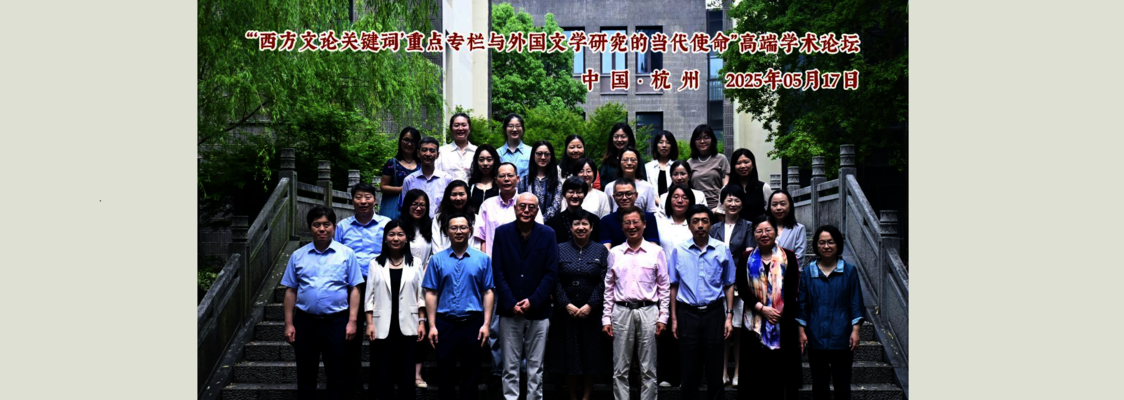- 知识传播、文化交流、文明互鉴:世界文学跨际互
- 机器翻译与人工翻译和谐共生
- 写论文要几步
- 英美文学方向论文写作方法谈
- Eastern/Western, European/Asian Dilemmas of
- 文学与图像之符号传播论
- 多学科视域下的汉语翻译文学
- 搭配强度统计方法
- 多维视野中的乌克兰语言政策与语言冲突
- 外交话语的学科建设与区域国别研究
- 新时代国别与区域研究方向的挑战、机遇与探索
- 数字人文视域下翻译研究:现状、问题与前景
- 伦理智慧与伦理选择
- M.H.艾布拉姆斯论人文主义批评
- 外事口译与翻译实践
- 人工智能与未来教育
- 苏联解体后的中俄关系:制度演化、发展动力与未
- 翻译研究学术论文的选题、写作与发表
- 圆桌论坛:风从东方来:西方艺术中的“中国风”
- 文化遗产与记忆:从过去到未来
预告:英美文学研究所学术沙龙
主题: Sublime and Sublimation in Romantic and Modernist Writings
时间:2020年7月8日(周三)下午14:00-15:30
地点:外国语学院学术沙龙钉钉群(群号:30286318)
主讲人:Prof. Youngmin Kim (金英敏) 教授
主讲人简介:
Youngmin Kim is Distinguished Research Professor Emeritus of the Humanities of Dongguk University. He is also Jack Ma Chair Professor of Ma Yun Education Fund, College of Foreign Studies, Hangzhou Normal University, China. He is currently the Director of Digital Humanities Center of Dongguk University, Visiting Fellow of Global Center for Technology in Humanities, Kyung Hee University, the Editor-in-Chief of Journal of English Language and Literature in Korea, Vice-President of International Association of Ethical Literary Criticism, Executive Council Member of International Comparative Literature Association, International Ezra Pound Society, and International Yeats Society. He wrote books and articles on Yeats, Pound, Hopkins, and Modern and Contemporary Poetry, Critical Theory, Cultural Studies, Lacanian Psychoanalysis, World Literature, and Transnationalism. His current research interest is modern and contemporary poetries in English, cultural translation, world literature, and trans/post media digital humanities. His recent articles appeared in Comparative Literature Studies, Foreign Literature Studies, Neohelicon, Interdisciplinary Studies of Literature, and Journal of English Language and Literature, etc.
内容简介:
Immanuel Kant takes over the issue of the sublime in his “Analytic of the Sublime” after Longinus’s “On the Sublime” and Edmund Burke’s “Of the Sublime,” and clarifies the affectivity of the sublime, tempering Burke’s terror with a strange form of joy. Kant argues that the feeling of the sublime is “produced by the feeling of a momentary inhibition of the vital forces followed immediately by an outpouring of them that is all the stronger.” Unlike the beautiful, which results in pure pleasure, the mind in sublime feeling is attracted by the object, and always reciprocally repelled. Sublime feeling thus works as “negative pleasure” while suspending momentarily the appealing power of attraction followed by what Wordsworth calls sudden outpouring of the “spontaneous overflow of powerful feeling.” This suspension of the powerful emotions further provokes the question of representation itself which fails to function properly at the initiating moment. Thus, the problematic of representation remains.
In this context, this lecture will trace the genealogy of the aesthetics of the sublime, from Longinus, Burke, Kant, Nietzsche, Freud (setting aside the postmodern sublime) on the one hand, and demonstrate how Romantic poets (focusing on Coleridge and Wordsworth) and modernist writers (focusing on Woolf, Lawrence, Yeats) grapple with the unrepresentable sublime both in their poetics and literary discourses, on the other hand. I would argue that both Romantic and Modernist writers manifest the sublime linguistic representation in their literary discourses in terms of “sublimation.”







